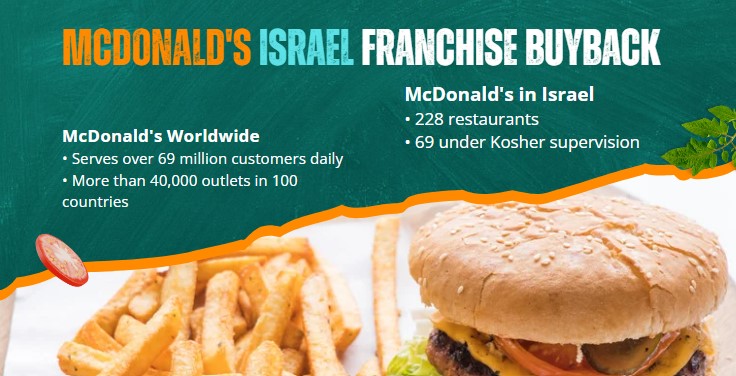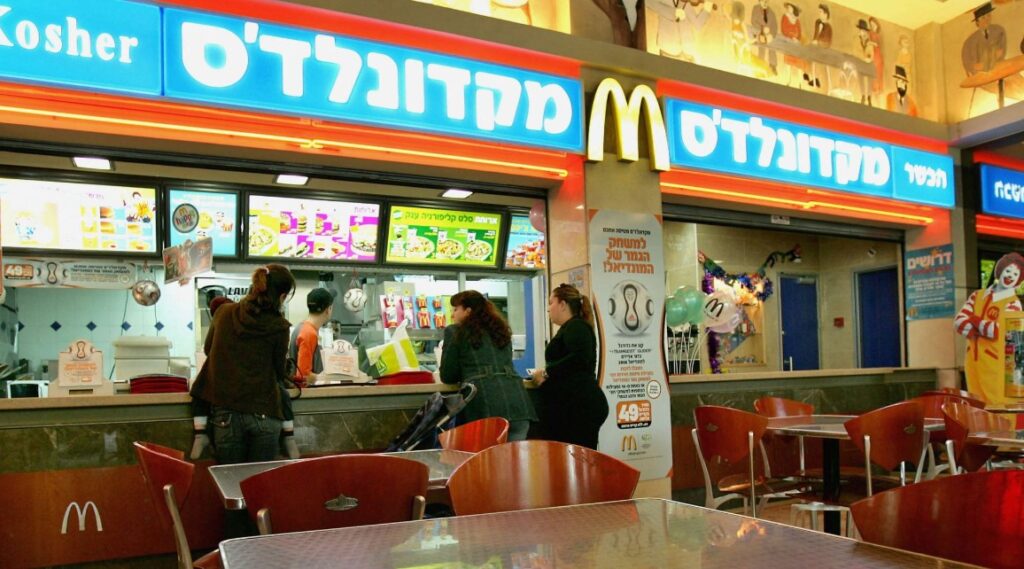The controversy surrounding McDonald’s in Israel highlights the complexities of operating a global brand in a region with deep-seated political conflicts
McDonald’s, the world-renowned fast-food giant, has recently announced its decision to take over ownership of its branches in Israel. This move comes after the company faced a significant backlash due to perceived support for Israel in its war against Hamas in Gaza. The boycott, sparked by Muslim-majority countries, has led to a slump in global sales, forcing McDonald’s to reconsider its strategy.
You Can Also Read: Crisis in Israel: Netanyahu’s Leadership at Risk
The decision has thrust Alonyal, the franchise company responsible for McDonald’s operations in Israel, and its CEO, Omri Padan, into the limelight. Padan, who has been at the helm of McDonald’s operations in Israel for three decades, has been no stranger to controversy related to the Israel-Palestinian conflict.
Omri Padan’s History of Controversy
Omri Padan, however, is not new to controversy related to the Israel-Palestinian conflict. In the 30 years the businessman has been operating restaurants for McDonald’s in Israel, he has been at the center of a number of disputes. In 2013, the Israeli businessman angered Israel’s settler movement when he refused calls to open a branch of the fast-food chain in the settlement of Ariel in the occupied West Bank. Padan’s company Alonyal was asked to set up a restaurant in a shopping center but declined, saying the firm had a policy of staying out of the occupied territories.
The Boycott and its Impact
The fast-food giant uses a franchise system, where individual operators are licensed to run outlets and employ staff. However, the broader company came in for criticism after Padan offered free meals to Israeli forces around the start of the Israel-Gaza war. A boycott was sparked after Muslim-majority countries such as Kuwait, Malaysia, and Pakistan issued statements distancing themselves from the firm for what they saw as support of Israel.
McDonald’s and the Settlements
Israel has built about 160 settlements housing some 700,000 Jews since it occupied the West Bank and East Jerusalem – land the Palestinians want as part of a future state – in the 1967 Middle East war. The vast majority of the international community considers the settlements illegal under international law, although Israel disputes this. Padan, a founder of the group Peace Now, which opposes settlements and considers them as hindrances to peace, is no longer associated with the group that was established in 1978.
In 2013, Alonyal’s refusal to open a branch in the West Bank settlement of Ariel sparked controversy, with the Yesha Council accusing McDonald’s of having an “anti-Israeli political agenda”.
The issue resurfaced in 2019 when McDonald’s won a tender to operate a restaurant and hot dog stand at Ben-Gurion Airport. Settlement leaders in the West Bank protested and called on authorities to block the move, while protests were held outside the fast-food chain’s restaurants in Tel Aviv.
History of McDonald’s Israel:
⦁ Entered Israel in 1993
⦁ First branch at the Ayalon Mall in Ramat Gan
⦁ 1997: First branch in an Israeli Arab city, Tamra
⦁ 1998: Began barbecuing hamburgers on charcoal
⦁ 2006: Replaced the international chain’s trademark yellow and red signs with blue and white
⦁ 2013: Turned down an offer to open a restaurant in Ariel, citing its declared policy not to open any branches in West Bank settlements
The Future of McDonald’s in Israel
On Thursday 4th April (20240), it was abruptly announced that Alonyal would sell the sprawling franchise back to the US food giant. The terms of the deal were not disclosed by McDonald’s, although a reputation management expert said that those outraged by the decision to offer free meals to Israeli forces may be “angry that this deal makes Padan possibly a very rich man”. They might be pleased though, about the effect the boycott has had. Padan’s departure comes after McDonald’s said that the Israel-Gaza conflict had “meaningfully impacted” performance in some overseas markets in the fourth quarter of 2023. For the unit that includes the Middle East, China, and India, sales growth stood at 0.7% in the fourth quarter of 2023 – far below market expectations.

McDonald’s Restaurants in Israel
McDonald’s, the world’s largest fast-food restaurant chain, serves over 69 million customers daily across 100 countries through more than 40,000 outlets. There are currently 228 McDonald’s restaurants in Israel, with 69 of them under Kosher supervision, meaning they are closed on Shabbat and Jewish holidays, have no mixed meat and dairy products, and for Passover, they serve the meat on Passover buns.
However, McDonald’s has announced that it will buy back all 225 of its Israel franchise restaurants from Alonyal Limited, the operator of McDonald’s in Israel, following months of dramatically lower sales due to pro-Palestinian boycott action amid the Israel-Hamas war.

In conclusion, the sudden decision by McDonald’s to take over ownership of its branches in Israel has brought the franchise company Alonyal and its chief executive Omri Padan into the spotlight.
The boycott, sparked by Mr Padan’s offer of free meals to Israeli forces, has had a significant impact on the fast-food giant’s sales, leading to the decision to buy back the franchises. While the terms of the deal have not been disclosed, it is clear that the controversy surrounding McDonald’s and the Israeli-Palestinian conflict will continue to be a topic of discussion.


